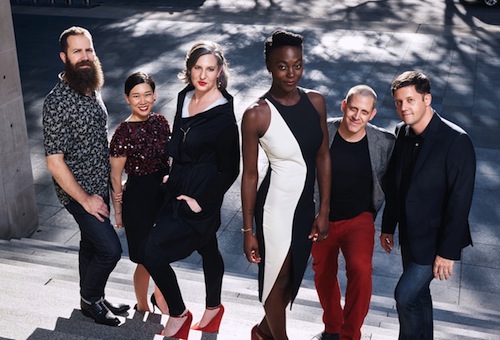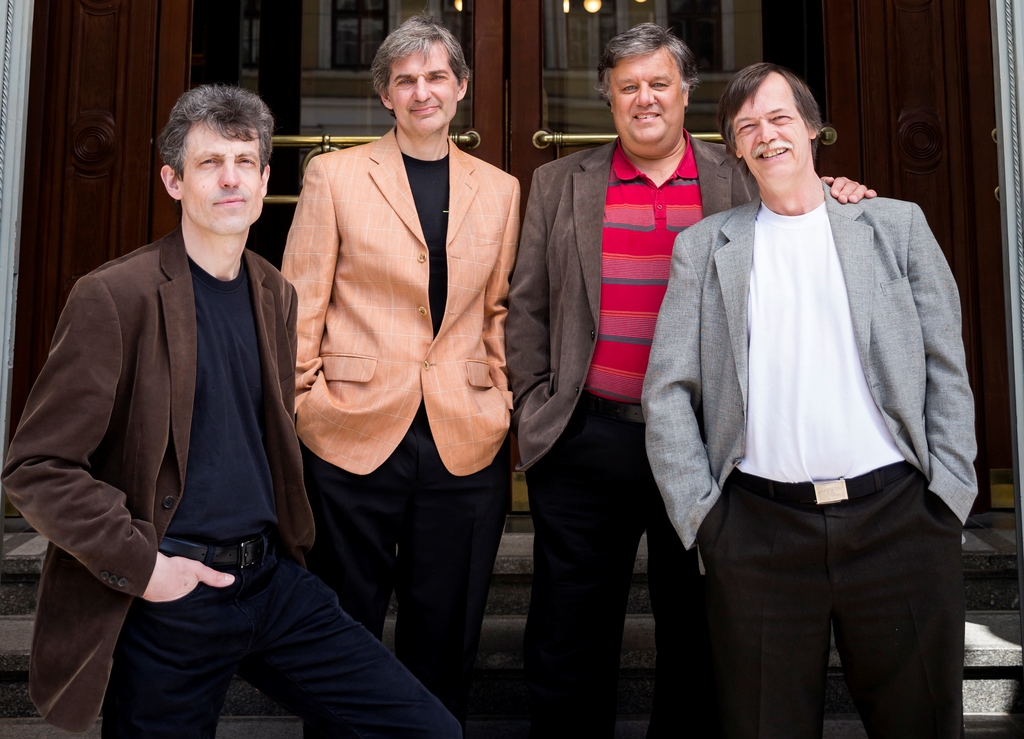A whole lot of percussion going on with Eighth Blackbird and Amadinda

The University of Chicago Presents’ György Ligeti series continued Friday night at the Logan Center with a marathon of marimbas, in which the Chicago-based Eighth Blackbird sextet was joined by Hungarian percussion quartet Amadinda.
The program was mainly dedicated to works by Steve Reich and two Ligetis (father György and son Lukas). Though these are not composers one normally links stylistically, the concert unearthed submerged continuities between them.
The evening opened, however, with a piece by Amadinda member Aurél Hollo, titled 39 – the Dream of the Manichaeian / beFORe JOHN3. Its program describes a Manichaeian feverishly dreaming of walls vibrating, a man being repeatedly whipped, and another man hoisting a net. You know, as one does.
I defy most listeners to hear any of this, or even the polarized duality of Manichaeianism itself. Thankfully, the music works very well when one ceases straining to perceive the program.
The individual textures are mostly reminiscent of Reich—complex interlocking rhythms, some more beholden to popular music than to classical.
But Hollo’s process is different. Each texture alters by one instrument breaking free, changing a layer. At each of these moments, our attention suddenly pivots to that player. The long rests he gave Zoltán Rácz to change instruments added to this drama; anticipating each oncoming sound in advance of hearing it added a nice effect.
What followed was the music of Ligeti (the father), but not as you’ve heard it before. These were Eighth Blackbird’s own arrangements by themselves of three of Ligeti’s piano Etudes (part of an ongoing project).
Ligeti’s Etudes are rooted in the specific instrumental qualities of the piano. And the danger of any rearrangement is the erasure of what was uniquely idiomatic in the original.
If anything, Eighth Blackbird’s arrangements sounded too idiomatic. Figures that normally whirl relentlessly through the piano were here passed smoothly between instruments. Once hazy lines shone in bright colors; once ambiguous boundaries became clear.
Taken in their own right, these arrangements are dazzling in both conception and virtuosic execution. The question is how much of Ligeti one still sees refracted through this kaleidoscope.
Lukas Ligeti’s Incandescence was heard in its North American premiere. Through some last-minute program shuffling, it now stood at the center of the program, closing the first half–which seemed the ideal position, neatly bridging the two musical worlds that bordered it.
The complete personnel of Eighth Blackbird and Amadinda joined forces for the only time onstage, visually linking things up. There was also the clear sense of sub-movements within the piece (like Reich), paired with the gestural specificity of Ligeti the elder.
But if this gives the impression that it was merely a hodgepodge of others’ influences, it was not. The work’s complexity came from the sheer abundance of different simultaneous lines, sometimes individuated as discrete strands, and other times coalescing into sheets of consolidated sound. Lukas Ligeti’s music stood tall among eminent company, with a cinematic opulence entirely its own.
The second half was all Steve Reich.
The Mallet Quartet was played by Amadinda, who gave the work’s world premiere in 2009. Rácz brought a dance-like lilt to certain rhythms in his part. The canons between him and Zóltan Váczi did not gently lap over each other; rather, the follower in each canon made his entrance clearly known by entering louder than his partner, as in a Bach fugue. The second movement was the most sensitively gradated, shaded not only between sections but within phrases. The third movement brought back the sharp playing of the first.
Matthew Duvall and Lisa Kaplan from Eighth Blackbird joined Amadinda for the sextet.The opening section was the only patch of Reich that was not crisply articulated; but this actually proved effective, allowing the piece to emerge gradually, as if from behind a cloud. When they reached the middle movement, in which Duvall and Kaplan were joined by Hollo and Károly Bojtos on bass drums, the four of them brought a Stravinskian fervor to their parts.
The Sextet revealed the only drawback of the evening’s program—that certain effects were inevitably heard too many times. When Reich wrote extended bowing of the vibraphone in its second movement, it’s unlikely that he expected an audience to think “Here they go, breaking out the bows again,” when this technique appeared for the umpteenth time in the concert. But this was repetition in the service of an unexpectedly unified evening.
The University of Chicago Presents continues 7:30 p.m. February 9 with the return of its Contempo-Jazz Double Bill, featuring the Imani Winds, Ensemble Dal Niente, and Craig Taborn: chicagopresents.uchicago.edu
Posted in Performances





